by Leslie Layton
Butte County’s Latino residents are becoming infected with COVID-19 at an alarmingly disproportionate rate, a reflection of the disparities surfacing throughout the nation that show low-income, immigrant and other minority communities hardest hit by the pandemic.
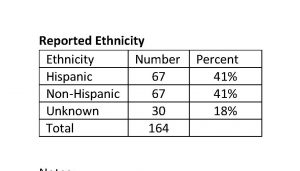
Figures released earlier this week to ChicoSol in response to a Public Records Act request show that people identifying as Hispanic comprised 41 percent of 164 Butte County residents who had tested positive for COVID-19 through June 28. Latinos and/or Hispanics make up less than 15 percent of the county’s population, according to estimates, but belong to what is by far the county’s largest minority group.
On Thursday, Butte County Public Health Department announced a third COVID-related death, but released no information on the patient’s town of residence or race as a privacy measure.
“The percentage of positive cases for Hispanics is far greater than the percentage of Hispanics in Butte County,” said Lisa Almaguer, a spokesperson for Public Health, acknowledging the disparity in the infection rate.
Almaguer said there will be a focus on outreach to the Latino/Hispanic community in coming weeks as the department distributes signs with safety guidelines in Spanish to businesses and churches. It plans to print a flier that includes a link to the state’s COVID website viewable in Spanish.
Gridley’s portion of the county’s total case count reached 71 — or 35 percent of 206 cases — on July 2; Almaguer said there had been “significant jumps” in new cases from the agricultural community. Home to some 7,000 people, Gridley only has about 3 percent of Butte County’s population; somewhere between 44 and 52 percent of residents identify as Latino or Hispanic, according to estimates by the United States Census and city leadership.
That makes Gridley the town with the largest concentration of people who identify as Latino/Hispanic among Butte County’s three largest cities.
Chico had 68 cases — 33 percent of the total count — on July 2, but has about 47 percent of the county’s total population.
Gridley Mayor Bruce Johnson says an educational campaign could be a waste of money.
“I think Gridley citizens are pretty smart,” Johnson told ChicoSol in a July 2 telephone interview. “I think they have the information. It’s an easy out to say, ‘We have to educate people more.’ I think people have the education unless they’ve been living under a rock.”
In local interviews and national media briefings, Latino leaders said members of their community face considerable obstacles. They’re often living in multi-generational or crowded households and working in jobs that constantly expose them to the public.
And some may be watching Spanish-language television from Mexico or other countries that downplay the seriousness of the virus, said Reyna Nolta, a member of the Hispanic Resources Council of Butte County.
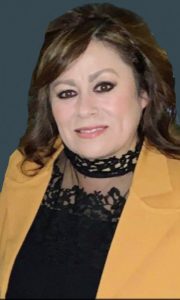
“They’re holding family gatherings and still acting like COVID won’t affect them,” Nolta said of Latino community members. “They don’t have enough information that would tell them how serious it is.”
Pandemic X-ray exposes health disparities
The pandemic’s blow to the Butte County Latino community reflects state and national patterns showing Latinos among the groups most affected by infection rates. Statewide, Latinos are one of the two largest groups “having a disproportionate share of cases relative to their share of the population,” says California’s COVID-tracking website. (The other group, statewide, is Native Hawaiian/Pacific Islander.)
And nationally, Latinos are suffering a COVID-related death rate many times higher than their white counterparts, says Daniel Turner-Lloveras, a physician and assistant professor at UCLA. In the 35 to 44-year-old age group, that death rate is eight times that of whites.
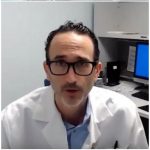
“I can’t think of another situation where the disparities are that great,” he said.
Public Health’s Almaguer says the department is tracing Butte County’s new cases to “family gatherings” and “workplace exposure.”
“To be clear, we’re not talking about farmworkers,” Almaguer said of workplace exposure. “There’s a variety of [other] essential roles.”
None of the new cases have been traced to agricultural work, and none have been traced to a graduation ceremony held in Gridley that was recently under some media scrutiny.
The public health department breaks down new cases to show whether they come from Chico, Oroville or Gridley, but smaller communities are grouped into a category called “Other.” A race/ethnicity breakdown by community was requested but has not yet been provided.
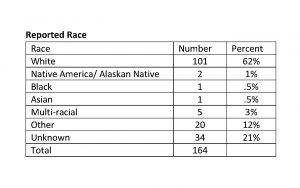
The Brookings Institution says the pandemic has been “like the flash of an X-ray” in exposing race disparities that include access to health care.
“The parts of the country hit hardest so far by COVID-19 have larger Black and Hispanic/Latino populations,” the article states.
Glenn County, which is almost 43 percent Hispanic, according to the last census count, is one of 19 California counties on the state’s watch list because of a sharp rise in new case numbers. Gov. Gavin Newsom has ordered the closure of indoor restaurants, wineries and movie theaters in that county and others.
Turner-Lloveras says immigrants are often afraid to use health care services because of fear that it will affect their immigration status, or if they’re undocumented, that it could lead to deportation.
That problem – exacerbated by new Trump administration “public charge” regulations – has “profound ramifications” for efforts to slow the spread of the virus, Ethnic Media Services has reported..
The Hispanic Resource Council’s Nolta said Butte County has a high number of undocumented people who were employed prior to the pandemic. Effective outreach to the region’s community – including to citizens, legal residents and undocumented workers – should include television advertising on local Univision and Telemundo channels in Spanish and fliers that explain the seriousness of COVID-19 and how to prevent contagion, she said.
Nolta says an informational campaign on the various state and federal programs that are available regardless of immigration status would also help. For example, a new federal program, Pandemic EBT, provides nutritional resources to low-income families during the pandemic.
(Northern Valley Catholic Social Service in Redding is listed as a partner of the governor’s Listos California educational campaign, but ChicoSol was unable to reach the agency for comment.)
Because of the pandemic, the Council has cancelled its annual Día del Campesino event that brings together some 50 groups, including social service agencies, to get information to the Latino community in a fair-like setting. Without that event, the Council doesn’t have the resources to conduct a campaign, which Nolta says would benefit from support from the Mexican Consulate and churches.
Gridley mayor: “It’s choices”
Gridley Mayor Johnson wears a mask in public and says he uses “common sense” to try and avoid becoming infected. He attends committee meetings on Zoom and avoids crowds, like the large group he saw that gathered in downtown Gridley in favor of Black Lives Matter on June 7.
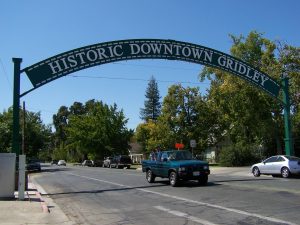
“The people around me, the people I go to meetings with, we all have that information,” Johnson said. “I’m not picking on the people who were protesters, but it’s not the time to demonstrate, it’s the time to not get sick. That’s the part I’m upset about.”
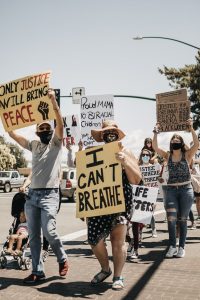
Krystal Santillan, a 21-year-old Butte College student who was at the protest, says there’s nothing to indicate that Gridley’s high COVID case count — particularly the new cases — are related to the event. About 80 people gathered, she said, maintaining social distancing between households, wearing masks and using hand sanitizer. Several were later tested for the virus and received negative results.
Santillan says her worry is the large number of people she sees shopping in Gridley not wearing masks “especially in the stores that don’t require them.”
When asked about Gridley’s disproportionate role in Butte County’s total case count, Johnson seemed unconvinced that a problem exists. “Facts are facts,” he said, “but keep in mind that next week that might change.”
Johnson said he doesn’t know of any town residents who have become hospitalized or have passed away from COVID-related problems. Testing has been available at the corner of Kentucky and Sycamore streets, he noted. “I think we’re handling it pretty well,” the mayor said.
“People have to make a living and are going back to work,” Johnson said. But he added that managing possible COVID exposure “could come down to a choice.”
“You have a choice,” the mayor said. “You go to work or stay home. I think [Gridley residents] are making the fairest choice they can being in the greatest country in the world. Here they have a choice.”
Johnson said people who feel unsafe working can stay home and collect unemployment insurance. What about undocumented workers who don’t qualify for unemployment insurance benefits?
“I don’t think there’s people here who would employ people like that,” Johnson said.
Perhaps in this country, Johnson said, the virus can’t be controlled given the value placed on personal freedom. “Here in the United States, people make their own choices. Without freedom, nothing else matters.”
At the state and national level, though, civil rights and immigrant advocacy groups are pointing to the pandemic’s disparities as unfair and evidence of deeper problems. The National Immigration Law Center’s Connie Choi says the country now finds itself at the “convergence of two pandemics” – health and racism – that are affecting minority communities that have large numbers of essential workers.
Says Choi: “Our communities have been and are profoundly affected by the pandemic. We’re actually at the epicenter of those who are affected and dying, those who are unemployed and excluded from relief.”
Leslie Layton is a bilingual freelance journalist who edits ChicoSol.

As a new, Caucasian home owner in Gridley I am truly appalled at the behavior of the residents of Gridley, predominantly the white ones who ignore basic hygeine and health practices in the stores throughout town. I am appalled by the mayor’s truly racist words and disgusting language. There is a huge education gap in Gridley when it comes to the virus and micro biology in general.
Yes, Hispanics are packed into tight places. No, they are not receiving education or outreach whatsoever.
As a white man, the abhorrent behavior of the businesses of Gridley that refuse to enforce mask wearing even by their employees, claiming this is “America,” and racists like Mr. Johnson are the true problems.
In Gridley, the employees of the local Ace Hardware on July 2nd were not only not wearing their masks in spite of signage on their own front entrance saying everyone had to wear a mask. When another customer who was maskless got to close to me, I asked him politely to stay 6 feet away. He screamed at me and physically pushed past me. I complained to staff and they talked to the man but essentially did nothing.
All over town people have gathered too closely together, mostly Hispanics. Education is needed now!
Before the mayor gets all defensive and start blaming a well organized protest over Black Lives Matter, why doesn’t he take a visit around his own town and see how people are actually behaving before putting his foot in his mouth. The ignorance of public health displayed by this public offical is embarrassing and dangerous.
A Concerned Resident.
The mayor of Gridley denies that there are employers there who hire undocumented workers. Wow.